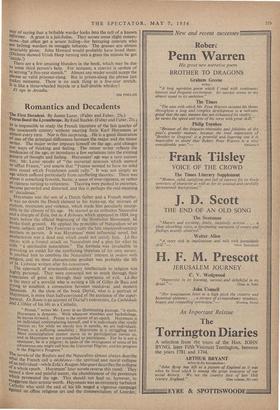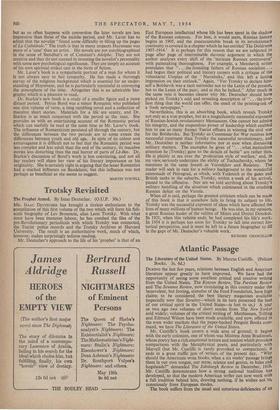Romantics and Decadents
IT is impossible to study the French literature of the last quarter of the nineteenth century without meeting Joris Karl Huysmans at almost every turn. Nor is this surprising. He is a good illustration of one of the principal differences between the major and the minor writer. The major writer imposes himself on the age, and changes our ways of thinking and feeling. The minor writer reflects the tendencies of the age, or introduces a few variations into the existing Pattern of thought and feeling. Huysmans' age was a very curious one. Mr. Laver speaks of "the universal neurosis which seemed to afflict France," and asserts that "France seemed to have no solid core round which Frenchmen could rally." It was not simply an age which suffered particularly from conflicting theories. There was about it something feverish, hectic, a sense of over-ripeness, or rather of ripeness turning to rottenness. Theoriei were pushed to extremes, became perverted and distorted, and this is perhaps the real meaning of decadence.'
Huysmans was the son of a Dutch father and a French mother. It was no doubt the Dutch element in his make-up, the mixture of realism, mysticism and violence, which made him peculiarly suscep- tible to the climate of his age. He started as an orthodox Naturalist and a disciple of Zola, but in A Rebours, which appeared in 1884, tw2 Years before the official beginning of the Symbolist Movement, he broke fresh ground. He applied the principles of Naturalism to an exotic subject, and Des Esseintes is really the late nineteenth-century aesthete in person. It was Huysmans' most influential novel, but aestheticism was a dead end which could not satisfy him. La .Bas °Pens with a frontal attack on Naturalism and a plea for what he Calls " a spiritualist naturalism." The formula was invaluable in Providing an outlet for the conflicting impulses of his own nature. It enabled him to combine the Naturalists' interest in ordure with religion, and its most characteristic product was probably the life of St. Lydwine written after his conversion. but as so often happens with conversion the later novels are less impressive than those of the middle period, and Mr. Laver has to admit that the novelist "found some difficulty in filling up the pages of La Cathedrale." The truth is that in many respects Huysmans was more of a 'case' than an artist. His novels are not autobiographical in the sense of Stendhal's or of Constant's Adolphe. They are not creative and they do not succeed in investing the novelist's personality with some new psychological significance. They are simply an account of his own spiritual ordeal cast in the form of fiction.
Mr. Laver's book is a sympathetic portrait of a man.for whom it is not always easy to feel sympathy. He has made a thorough survey of the religious backgrdund which is essential for an under- standing of Huysmans, and he is particularly successful in conveying the atmosphere of the time. Altogether this is an admirable bio- graphy which is a pleasure to read.
Dr. Starkie's new book is a study of a smaller figure and a more distant period. Petrus Borel was a minor Romantic who published. one slim volume of verse, a long rambling novel and a collection of macabre short stories. Materials for a life' are scanty, and Dr. Starkie is as much concerned with the period as the man. She provides us with an entertaining account of the Romantic period which can usefully be read at the same time as Mr. Laver's book. The influence of Romanticism persisted all through the century, but the differences between the two periods are to some extent the differences between youth and old age. In spite of its colour and extravagance it is difficult not to feel that the Romantic period was less complex and less adult than the end of the century, its macabre stories less disturbing than the real horror of parts of IA-Bas. Dr. Starkie's discussion of Borel's work is less convincing, and not all her readers will share her view of his literary importance or his originality. She is certainly right in arguing that the lesser Romantics had a marked influence on Baudelaire; but this influence was not perhaps as beneficial as she seems to suggest.
MARTIN TURNELL











































 Previous page
Previous page